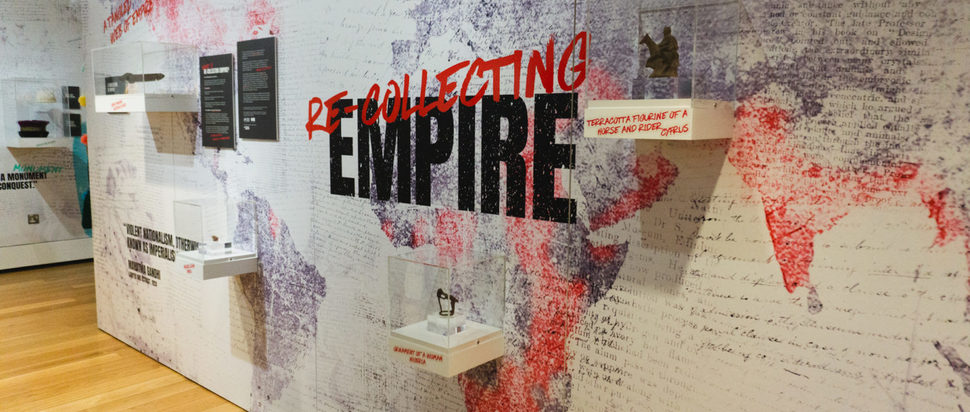Re-collecting Empire, and reimagining the museum
Beth James reflects on the Wardlaw Museum’s current exhibition Re-collecting Empire, which focuses on the legacy of empire in the museum’s collections
Re-collecting Empire addresses the entangled histories and implications of colonialism using the historic collection at the Wardlaw Museum. A wide array of objects from the museum’s collection are displayed throughout the exhibition space, complemented by contemporary voices, perspectives, and artistic responses that challenge the dominant history of colonialism that has often reduced the cultural importance of such objects. The exhibition is part of a wider project across the University of St. Andrews, with the aim of examining and critiquing the university’s relationship to empire and colonialism in order to create a more equitable institution.
The exhibition aims to engage the public in important conversations surrounding colonial histories and their contemporary repercussions. Museum collections make for a rich starting point when it comes to acknowledging cultural institutions as perpetrators of colonial ideologies throughout their history. The exhibition intends to address, explore, and hopefully rewrite the entangled histories that connect the museum with the British Empire and the colonial project. While there is little information on the provenance of many of the objects in the Wardlaw’s collections, the intention to tackle the imbalance of historical and cultural accuracy is an important move.
Re-collecting Empire marks a move away from centering the dominant historical narrative, in a search to better understand and present collections that are from different cultures and peoples. The exhibition demonstrates this by admitting that mistakes will be made in the curatorial process, and that this is an ongoing project intended to influence future collection and exhibition practices. Stations around the gallery ask the audience to either write an answer to the question 'What does empire mean to you?' to be displayed alongside the exhibition, or to write a new caption for one of the objects exhibited.
Alongside the objects on display are quotes by contemporary figures such as historian David Olusoga, who says: “The empire was an extractive, exploitative, racist and violent institution and the history of empire is one we need to confront and come to terms with, rather than celebrate.” Meanwhile, political scientist Ariadne Collins says: “Empire is about power – the power to take and the power to expand through violence and discipline, while repressing and marginalising that which is deemed unsuitable to its extremely imposed demands.” These quotes are splashed across the walls of the exhibition, in stark contrast to the more rigid ways in which the museum’s objects have historically been recorded, archived, and displayed. Placing importance upon these voices emphasises the need for intervention in museum practice, especially when it comes to addressing colonial histories.
The active, open-ended nature of the project is evidenced in the display of an object that simply has the caption, 'hand bell' and is noted as being from China. When the item came into the museum’s possession, very little information accompanied it. There was no information as to how it was acquired or where in China it had come from. However, after discussions with the wider public in an attempt to understand this object more, it was discovered that it was not a 'hand bell' as recorded, but rather part of a larger set of bells that would have been played with hammers during special ceremonies. Only through an outward, public discussion was the true cultural importance of this object understood and shared.
Artist, curator, and researcher Alberta Whittle, who is representing Scotland in the 59th Venice Biennale this year, was commissioned to create a new set of prints for the exhibition. Whittle’s work is motivated by a desire to battle anti-Blackness through acts of self-compassion and collective care. Through the lens of Whittle’s Barbadian-Scottish heritage, her work engages with the lasting effects of colonialism and empire in the diaspora. The new work commissioned for Re-collecting Empire was created in response to objects in the museum’s collection. The colours used in the prints, titled The Conjuror, are reminiscent of those used on signs in the Caribbean to advertise parties, with gradients of vivid pink and blue. This link to Caribbean society and hospitality highlights the exclusive nature of colonialism’s impact in a contemporary context – who is welcome and who is not? Whose voice can be heard and whose voice is silenced?
Re-collecting Empire continues until 22 Oct at the Wardlaw Museum, University of St. Andrews
